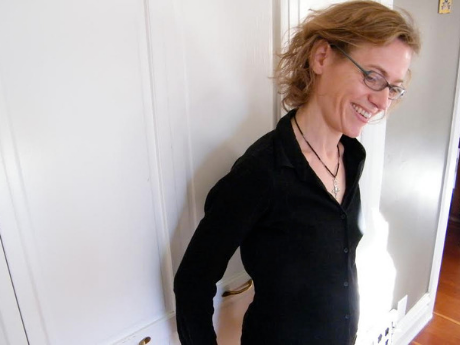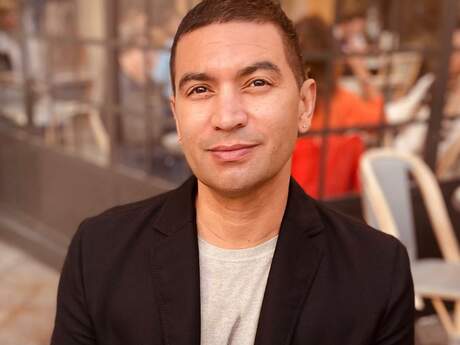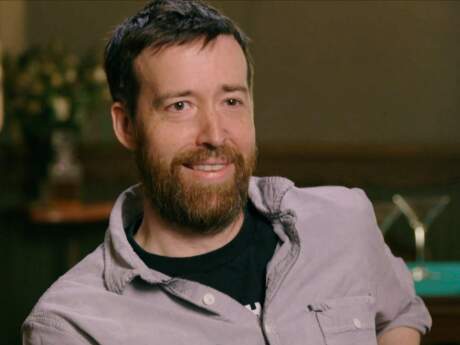Q & A: American Poetry
Q & A American Poetry: Julie Carr

Questions 1 and 2 together: Is there something specifically American about American Poetry? In what ways do you consider yourself an American poet?
A real answer to this question must start with some other nation's poetry. One should have a deep knowledge of at least one other culture, in order to argue for the specificity of things American.
What many of us have, including myself, is knowledge of British poetry before 1900. But the British is not quite an "other culture," since the American reaction to the British so sharply defines us, or defined us in centuries prior to this one. But that is an old story, and I'd like to tell a slightly newer story in thinking about American poems.
In 1962 at the Judson Memorial Church in Manhattan several dancers and choreographers came together to study composition under Robert Dunn, who had himself studied with John Cage. The dances these people created in the following years included Yvonne Rainer's "Trio A," and Trisha Brown's "Group Primary Accumulation," pieces necessary, in my view, to any real understanding of American dance (or art in general). The collective called "The Grand Union," developed out of this moment, as did Contact Improvisation, initiated by Steve Paxton's explorations with gravity, momentum, and weight. What these dancers, dances, and explorations shared was an interest in egalitarian structures, in accumulative (rather than narrative or classical) scores, in taking improvisation as an art, rather than a means to an end, in releasing the body from rigid technical requirements (such as those demanded by Graham Technique or Ballet). They were developing an art form from the bottom up, starting from the dream of physical and creative freedom and from the utopian visions of American dancers from Isadora Duncan onward. Rejecting the hierarchies of choreographer to company, of performer to audience member, of stage to street, rejecting the linear and narrative line, valuing surprise and shock, even boredom and estrangement, these dancers and their students brought dance and performance into the parks, the gyms, the subways, and onto the roofs and walls of buildings.
As I danced in and with this tradition through my twenties in New York, I was an American dancer. In as much as I have translated these values into language, into how I deal with the line and the page, how I choose one or another utterance, tone, or lexicon, I can say I am an American poet.
In 1989 I watched Steve Paxton and Lisa Nelson perform a dance called "PA RT," Paxton in sunglasses, Nelson in a mustache. The piece was set to a score that included text, and though I have no memory of this text, what I remember is the fact of the language, and the way in which the language and movement came together, or did not. It was loose, it was open, it left a lot to the imagination. This was the beginning of a very particular aesthetic education, one that is, I believe, uniquely American in its love of the unknown and unknowable, the incomplete, the in-progress, the new. I think of that moment of "reading/listening/watching" as an initiation of sorts, for it prepared me for the work of Ashbery, Cage, Schuyler, Hejinian, MacLow, Myles. That particular aesthetic education that began in theaters and dance studios allows me to read Dickinson, Crane, or Guest in particular ways and pushes me toward the work of my peers that most surprises me, sets me off balance. To be off balance might be a specifically American pleasure.
But this is about style, about form and formlessness, about attitude and curiosity. Content too drives my work, and what is content? The lived experiences of anyone's day (and lived experience includes reading, watching, imagining – as well as doing or being done to). For me lately, that content, the content of the poem and the content of the country, is unavoidably violent, for as we all know and usually remember, America's history begins in violence. I was born at the tail end of the Vietnam War, grew up during a time of race riots on the news, and in my city, Boston. As a child of an activist, I was intensely aware of what we were marching against; that is, I was aware that the threat and reality of violence was everywhere: in my home, in my neighborhood, in my city, throughout my country, and abroad. Having recently moved to Colorado, I've been confronting the legacy of gun violence, in schools, streets, and homes, that in many ways defines the West. As I write this (March, 2010), "protesters" throw bricks through the windows of lawmakers in the name of freedom, in the name of independence. Might there be relationships between the positive values of improvisation, boundary breaking, independence (or "self- reliance": "I shun father and mother and wife and brother, when my genius calls me. I would write on the lintels of the door-post, Whim") and violence? Might we be bound to explore those relationships in and by way of the poem?
What role do historical and geographical factors play in American poetry? What other aspects of your life and identity (gender, ethnicity, etc.) relate to your sense of being a poet in America?
My mother was born in Washington DC, her grandparents were Jewish immigrants from Latvia and owned and lived above a small grocery store. She was an army brat in the fifties, told not to wear jeans since they might make her pregnant, finished college in three years in order to marry. Later she became a feminist, an anti-war activist, a civil-rights lawyer, and a weaver of blankets. My father was a Western kid, brought up in Arizona, Oregon, Indiana, and California. His father was a struggling businessman from the mid-west, his mother a wisecracking former Chautauqua manager, one of a family of 10 kids. His maternal grandfather was a farmer, a rancher, a congressman representing the Populist Party, a séance holder, and an atheist. He was the first person who lived in a sod house when elected to the Congress. Thus I inherit some of America's stories, some of its persistent themes: immigration spurned by poverty and persecution, class mobility, the migration from the rural to the urban (and back again), the blending or blurring of ethnicities and religions, the struggle and rise of feminism, activism.
That I am white, that I am female, that I am Jewish, that I am from a middle-class family with roots in the American West and in Latvia and Lithuania, that I am a Democrat, that I have lived in Boston, New York, Berkeley, Oakland, and Denver: none of these seem as clear to me as the fact that I am responsible for raising three children and raising them well. I cannot fully see my American-ness, I struggle to recognize all other aspects of my identity, but I can see that I am a mother because of the bodies of my children. And, as it was not always the case that I was a mother (for I was always American, always female, always white, always Jewish), I can think about it as I cannot honestly think about these other aspects of myself—these other facets of identity which are invisible mostly to myself, though visible, I assume, to all others.
However, one does not write "as" an anything, other than as a person who knows a language. One writes not to reveal an identity, but to escape one, and, in escaping, to find something previously unknown. The analogy is to swimming: with each stroke, one attempts to reach beyond one's wake. But in doing so, one is always remaking that wake, redefining the boundaries of one's moving body. And yet, if I were to claim an identity in writing, it would be the identity of a mother. This is not because motherhood defines or limits me. Rather, it is because the radical loss of the boundaries of the self that parenthood presupposes and demands is a powerful metaphor for what I want my writing to do: to free and to open the edges of what I consider to be myself, to open those edges to influence.
When you consider your "tradition" do you think of American poets in particular? What historical poets do you think most important to American poetry?
My "tradition" includes anything I have read and understood to be powerful. First I read Dickinson as a girl, but then I read Roethke and Whitman. Later, Rich, Levertov, Valentine. Stevens, Williams, Crane, and Stein. Char and Milosz. Akhmatova, Amichai, and Salamun. Hopkins, Keats, Shelley. Coleridge and Wordsworth. Oppen, Niedecker. O'Hara, Ashbery, Schuyler, Notley. Hejinain, Hillman, Swensen, Mullen. Rossetti, Rossetti, and Swinburne. Baudelaire, Rimbaud, and Mallarme. Now I am reading Inger Christensen, Vallejo, Darwish. And so, with any luck, my tradition grows outward—backward in time (right now I am reading 15th Century Vietnamese poet Nguyen Trai), and across seas. Forward in time too, as the poets of the future will be my tradition later. Influence is constant, and the reading of poetry a lifetime of exploration. I want no limits on my reading and no limits on my influence ("to limit it is to kill it" as Williams said.) This desire to read it all is perhaps not very American, given the shocking paucity of available translations (3 % of all books published, as we know). However, voraciousness, for better or for worse, is certainly an American trait, and might, with the help of presses like New Directions, Archipelago, Dalkey Archive, Action Books, Counterpath, and others, direct itself toward more writers from elsewhere. Only then will we have any inkling of what American poetry is.
What are your predictions for American poetry?
Predictions? I should leave all predictions to Frank O'Hara. But in my most optimistic moods I predict more and more people will read poetry and more and more will write it. This spreading out of the genre, aided by technology, will nonetheless be driven by a collective need to save, and be saved by, the voice and the body. Poetry is an art of the body, that is, of the senses: the ear and mouth and eye. Even the most abstract, the most conceptual, the least personal or expressive of poems or poem-like objects emerge under the guidance of someone's hands. We turn to poems in order to counter (and thereby acknowledge) the shame we feel in being human. This shame, which is partnered by pride, is best confronted by the humble affection we have for one another, for that specific and human stranger that can be immediately apprehended in the lines of any poem that does not know exactly what it is.
Published 2010.


